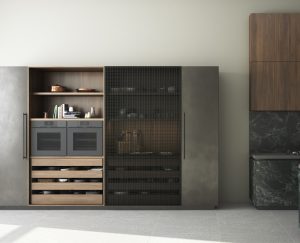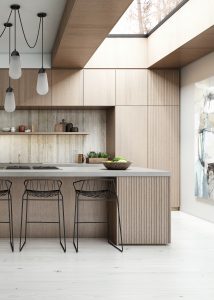Cabbonet collection launches with the aim of making high-end cabinetry more affordable. By Dianne M. Pogoda
Why does good design need to be so expensive?
It’s a common lament among designers, suppliers and consumers alike, and one Andrew Hays is trying to address.

Hays is founder of a new line of kitchen and bath cabinetry and closet fittings — Cabbonet — launched under the umbrella of his British design house Arteim.
“I’ve always targeted the luxury end of the market, and felt there was something missing at affordable prices in kitchen design,” says Hays, adding that many manufacturers have brought high style to other parts of interior design, like furniture. But that styling combined with high-quality manufacturing wasn’t widely available in kitchens. Thus, Cabbonet was born.
“Consumers are very savvy now, in the digital age. They’re on Pinterest and social media, they look up everything and know what style is and what they like, no matter their budget,” he observes. “Our aim is to provide high style at an accessible price point without sacrificing quality.”
Working with Hays is Neil Bailey, who serves as president of Cabbonet USA and is also on the board of the NKBA. The two worked together at high-end cabinetry makers Poggenpohl and Smallbone of Devizes in Europe.
Through Arteim, Hays, who is an architect, designs spaces, furniture, sets and costumes for live performances, film, TV — just about anything. His forte is “experiential design that appeals to the senses, practical, beautiful and tactile.”
At Poggenpohl, Hays came up with the “Fourth Wall” concept, which features a glass wall that transitions from clear to opaque to allow an open concept kitchen but can hide cooking, cleanup, pantry or other areas from view as needed. The Fourth Wall was named for the invisible “wall” between actors on stage and the audience.

Designed in England, Cabbonet (a 13th-century Old English term for a “chest for safekeeping”) is produced in a state-of-the-art dedicated facility in the Tuscan region of Italy. The aim of the line is to have a high-style, custom look and high-quality construction, but to keep prices accessible, Hays said. With more than a million square feet of manufacturing capacity, typical turnaround is about eight weeks, depending on finish.
“Italy is synonymous with craft and style,” he says. “There’s a hub of high-tech manufacturing there as well as artisans in so many areas — stone workers, metalsmiths, timber, tile — the process is highly automated, but we offer a vast array of materials and textures.”
The line is offered in 36 veneers and 12 metals. Among the options are wood, metal and stone doors, and accents include brass, bronze, rose gold, black nickel and black bronze. The woods offered include ebony, eucalyptus, aged oak and some reclaimed timber. All of it is compliant with U.S. manufacturing standards; CARB 2 compliant, making it very stable and warp/expansion resistant, and harvesting is traceable and Forest Stewardship Council (FSC)-certified.
“The styling is super contemporary but done in a way that references the past,” Hays says. “it’s nostalgic and comforting, but interpreted in a very modern way. We’ve also introduced automation technology fused with beautiful, soulful materials.”
He points out they also offer a new style of door, wood with a resin edge. This is significant because it holds up well and reduces the cost of the cabinet since it’s not all wood.

The manufacturing facility utilizes highly efficient machinery to produce the actual cabinetry, but the company also contracts local metalsmiths, veneer houses and other craft-focused shops to finish the line. This, Hays says, is what helps keep prices down.
Another factor in pricing is a lean distribution structure. Cutting layers in the process allows for a direct, simpler distribution through designers and high-end dealerships, with the initial rollout in the U.K., U.S. and Russia. So far, the company has 11 retail partners across the U.S., and will continue to build a distribution network and work with independent designers as well. The company’s website is www.cabbonet.com.
Versatility and flexibility also help distinguish Cabbonet. Hays says they can react quickly to trends in the market or to suggestions from designers.
“Since this company is founded and run by creatives, we understand the creative process,” he notes. “We think like designers, so we try to react as designers, and have simplified the ordering/spec process to make it easier for designers.”








